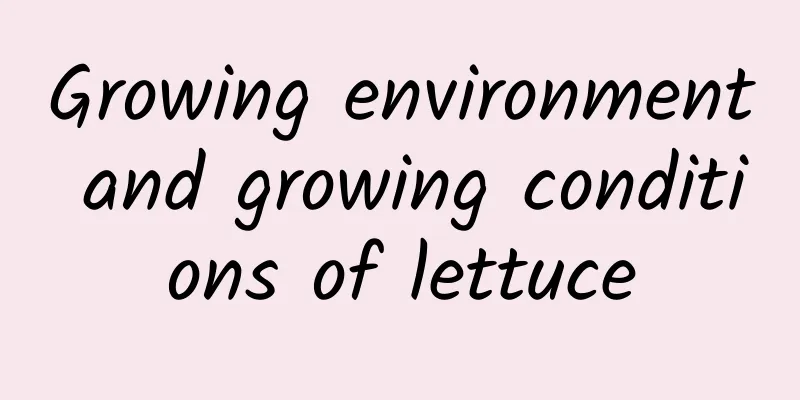Growing environment and growing conditions of lettuce

Lettuce growing environment and conditionsLettuce was originally distributed along the Mediterranean coast of Europe. It was introduced to China in the late Qing Dynasty and is widely cultivated in China's southeastern coastal areas and Guangdong and Guangxi regions. In recent years, the cultivated area has expanded rapidly across the country and it has become a common vegetable on people's tables. Lettuce Growing ConditionsLettuce is a long-day crop and prefers an environment with plenty of sunlight. Only then will its leaves grow green and thick. If it is dark and humid for a long time, it will affect the development of leaves and stems. Lettuce prefers slightly acidic soil. The suitable soil pH value is about 6.0. When the pH value is below 5 and above 7, it will not grow well. Lettuce growing temperatureLettuce prefers a cool environment and is not resistant to high or low temperature environments. The suitable growth temperature is between 15-20 degrees, the suitable germination temperature is 18-22 degrees, it will not germinate above 30 degrees, and it can tolerate short-term low temperatures of 0 degrees. Lettuce growing processThe growth process of lettuce includes the germination stage, seedling stage, rosette stage and heading stage. It takes about 10 days from seed germination to cotyledon unfolding, and about 20 to 25 days from the appearance of true leaves to the unfolding of 5 leaves. After that, it takes half a month to a month for the heart leaves to begin to curl up, and it takes about 30-40 days for the heart leaves to accelerate the curling into a hypertrophic leaf head. Lettuce planting time and methodIt is best to plant lettuce from October to December, and avoid overly cold or overheated environments. Before planting, buy high-quality, plump seeds, choose disease-resistant varieties with a higher germination rate, prepare a suitable seedbed, disinfect it, and water it thoroughly for later use. Mix the seeds with sand and sow them into the soil, cover them with soil, and place them in a ventilated environment. |
<<: The growing environment and local conditions of Cistanche deserticola
>>: The growth environment and local conditions of Dendrobium officinale
Recommend
Breeding methods and precautions of alpine rhododendron
Alpine rhododendron species are not easy to keep ...
Cultivation methods and precautions of Phoenix orchid
How to cultivate Phoenix orchid Soil and Fertiliz...
How to keep seeds of Roselle? Seed sowing time and method
How to keep Roselle seeds Roselle generally refer...
How to propagate Guanyin bamboo and what to pay attention to
How to propagate Guanyin bamboo Guanyin bamboo is...
Corn planting time and method
Corn planting time Corn can be divided into sprin...
How to make your own fertilizer for Jasmine
1. Fertilizer in life The water used to wash rice...
Where is rosewood suitable for growth? What are the growth environment requirements?
Where does rosewood grow? Rosewood is suitable fo...
Can mint be propagated by cuttings?
Mint is a common plant with amazing reproductive ...
What to do after hyacinth is pinched by arrows
reason Low temperature Hyacinths generally need t...
How often should you water your apple tree? What is the best time and method to water your apple tree?
Apple trees are very water-loving fruit trees, so...
Is Lavender Poisonous?
Is Lavender Poisonous? Although featherleaf laven...
How to prolong the flowering period of lotus
1. Suitable temperature This flower likes warmth ...
What kind of soil is better for growing succulents? How to make your own
1. What kind of soil is better for growing succul...
How to Identify Centella Asiatica
1. Blades The leaves of Centella asiatica are kid...
The fastest way to root wisteria cuttings
Wisteria cutting time Wisteria can be propagated ...









